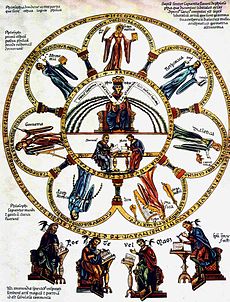
Back فلسفة القرون الوسطى Arabic Filosofía medieval AST Orta Əsrlər fəlsəfəsi Azerbaijani Урта быуат фәлсәфәһе Bashkir Средновековна философия Bulgarian মধ্যযুগীয় দর্শন Bengali/Bangla Srednjovjekovna filozofija BS Filosofia medieval Catalan فەلسەفەی سەدەکانی ناوەڕاست CKB Středověká filozofie Czech

Medieval philosophy is the philosophy that existed through the Middle Ages, the period roughly extending from the fall of the Western Roman Empire in the 5th century until after the Renaissance in the 13th and 14th centuries.[1] Medieval philosophy, understood as a project of independent philosophical inquiry, began in Baghdad, in the middle of the 8th century,[1] and in France and Germany, in the itinerant court of Charlemagne in Aachen, in the last quarter of the 8th century.[1][2] It is defined partly by the process of rediscovering the ancient culture developed in Greece and Rome during the Classical period,[1] and partly by the need to address theological problems and to integrate sacred doctrine with secular learning. This is one of the defining characteristics in this time period. Understanding God was the focal point of study of the philosophers at that time, Muslim and Christian alike.
The history of medieval philosophy is traditionally divided into two main periods: the period in the Latin West following the Early Middle Ages until the 12th century, when the works of Aristotle and Plato were rediscovered, translated, and studied upon, and the "golden age" of the 12th, 13th and 14th centuries in the Latin West, which witnessed the culmination of the recovery of ancient philosophy, along with the reception of its Arabic commentators,[1] and significant developments in the fields of philosophy of religion, logic, and metaphysics.
The high medieval Scholastic period was disparagingly treated by the Renaissance humanists, who saw it as a barbaric "middle period" between the Classical age of Greek and Roman culture, and the rebirth or renaissance of Classical culture.[1] Modern historians consider the medieval era to be one of philosophical development, heavily influenced by Christian theology. One of the most notable thinkers of the era, Thomas of Aquinas, never considered himself a philosopher, and criticized philosophers for always "falling short of the true and proper wisdom".[3]
The problems discussed throughout this period are the relation of faith to reason, the existence and simplicity of God, the purpose of theology and metaphysics, and the problems of knowledge, of universals, and of individuation.[4]: 1
| Part of a series on |
| Philosophy |
|---|
- ^ a b c d e f Spade, Paul Vincent (2018). "Medieval Philosophy". In Edward N. Zalta (ed.). Stanford Encyclopedia of Philosophy. Center for the Study of Language and Information.
- ^ Pasnau, Robert (2010). "Introduction". The Cambridge History of Medieval Philosophy. Cambridge: Cambridge University Press. p. 1. ISBN 978-0-521-76216-8.
- ^ Davies, Brian (2004). Aquinas. Continuum International Publishing Group. p. 14.
- ^ Gracia, Jorge J. E.; Noone, Timothy B. (2003). A Companion to Philosophy in the Middle Ages. Oxford: Blackwell. ISBN 9780631216728.